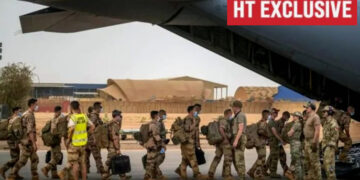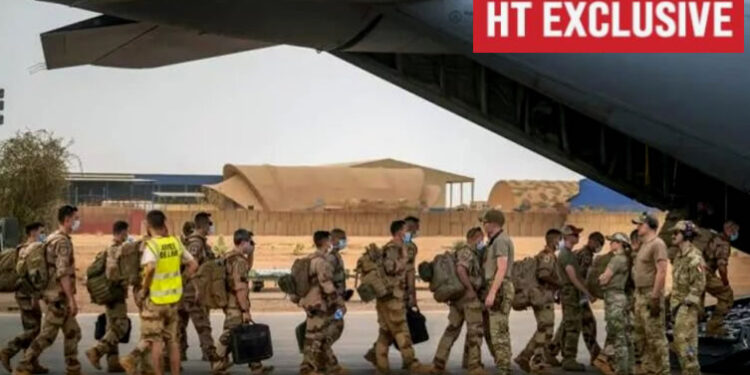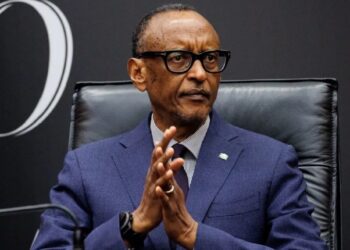By John Ikani
In seven short months, France has gone from the self-appointed guardian of West African security to an outsider with no seat at the table. The shift, once denied in Paris is now all but confessed.
The final nail came in mid-July. In Dakar, France quietly handed over Camp Geille, its last military base in Senegal. No ceremony, no speeches. Just a handoff that marked the end of France’s physical military presence in the Sahel. Days later, a top French official made it plain: West Africa’s security was “no longer our concern.”
That line came from Thani Mohamed-Soilihi, France’s Minister Delegate for Francophone Affairs. He did not sugarcoat it. Speaking by phone with journalists while attending G20 development talks in South Africa, he shrugged off the fall of France’s Sahel mission. “I’m sorry to say,” he told Reuters, “but it no longer concerns us.”
It was a statement that would have been unthinkable just a year ago. Back then, President Emmanuel Macron was busy denying what the world could already see: France was being shoved out of Africa, one base and one country at a time. Macron insisted it was just a “reorganization.” France was not being pushed out he said, only pivoting.
But the reality is this. France has been expelled. Not only from Mali, Burkina Faso, and Niger, but now also from Senegal. These countries did not just ask France to leave, they told it must, and they are not looking back.
A partnership that turned sour
For decades, France framed itself as West Africa’s security partner. Troops were stationed across the region. Counterterrorism operations were carried out with French backing. Paris claimed it was helping protect sovereignty.
But for the countries on the receiving end, that narrative wore thin. France’s soldiers came and stayed. The threats never disappeared. And eventually, what France called support began to feel like control.
By early 2025, countries that had long relied on France began slamming the door. One after another, Mali, Burkina Faso, Niger, Chad, Gabon. Even Senegal, the last to hold out, eventually asked France to go.
This was not just about soldiers. It was about dignity. In the words of Burkina Faso’s president, Macron’s comments about African states being unable to exist without France were not just wrong, they were insulting. “He has degraded all Africans,” the president said. “He does not see us as human beings.”
Macron’s earlier remarks had laid the groundwork for the backlash. In January, facing a tide of anti-French protests, he said, “I think that they forgot to thank us, but that’s okay, it will come in time.” Then he doubled down. “None of them would have a sovereign state if the French army had not deployed.”
That tone, part scolding, part smug, helped seal France’s fate. The message many Africans heard was clear: France still thought of itself as the parent, not a partner.
Russia moves in as France moves out
As France pulled back, others rushed in. And none faster than Russia. In Mali, Burkina Faso, and Niger, where French troops once roamed, Russian mercenaries now fill the vacuum.
The Wagner Group, now operating under the banner “Africa Corps,” has extended its reach into at least six African countries. They are training troops, advising leaders, and spreading anti-Western propaganda. In return, they are pocketing mining rights and security contracts.
It is a sharp swap: French boots out, Russian boots in, though some now wear no uniforms at all.
The Sahel has become one of the most unstable regions on earth. Terror attacks have surged. Coups have replaced elections. Faith in institutions is crumbling. And France, once the loudest voice in the room, now watches from the sidelines.
French officials say they are trying a new approach, one that does not rely on military force. Thani Mohamed-Soilihi hinted at this during his call: “We’re looking for other ways to maintain ties that are not necessarily military.”
But skepticism is high. In January, Burkina Faso’s president warned that France will never truly leave. “They will set up security companies to secure their companies,” he said. “But the soldiers will be there. You will no longer see them in uniform or gathered in bases.”
His prediction touches on a deeper fear: that France, even in retreat, will find ways to hang on, not through armies, but through contractors and influence behind closed doors.
France’s fall, Africa’s reckoning
What is unfolding now is not just about military bases or diplomatic slights. It is the collapse of a decades-old system built on uneven footing.
France called it partnership. Many Africans called it postcolonial control.
The shift has exposed the gap between France’s vision and reality. Macron tried to spin the exits as strategic, a sober rethinking of old ties. But as the last French flag came down in Dakar, it was clear this was no strategy: it was surrender.
For West African nations, France’s exit is a reset. A chance to look elsewhere, to rely on themselves or turn to new players, even those with questionable motives. Whether that turns out better or worse remains to be seen.
For France, it is a reckoning. Decades of influence have vanished in under a year. The region it once claimed to protect has moved on. And the question left behind is simple. What was all that presence, all those missions, all that money, for?
Because now, France is out and West Africa have no doubt that they are better off without French influence.



































